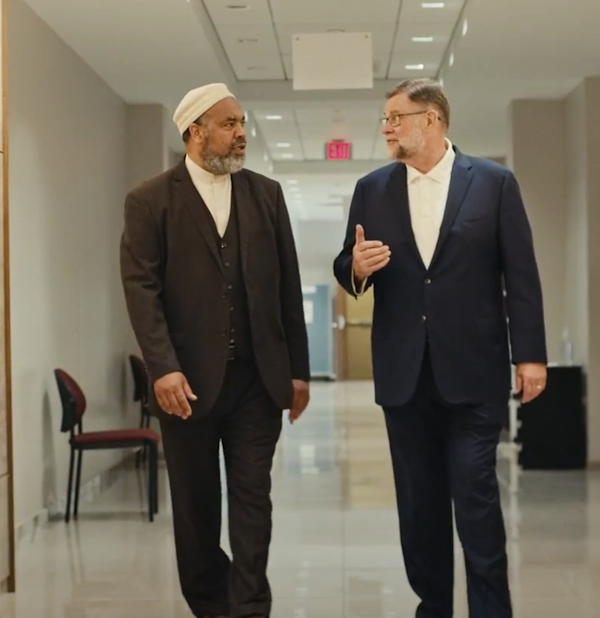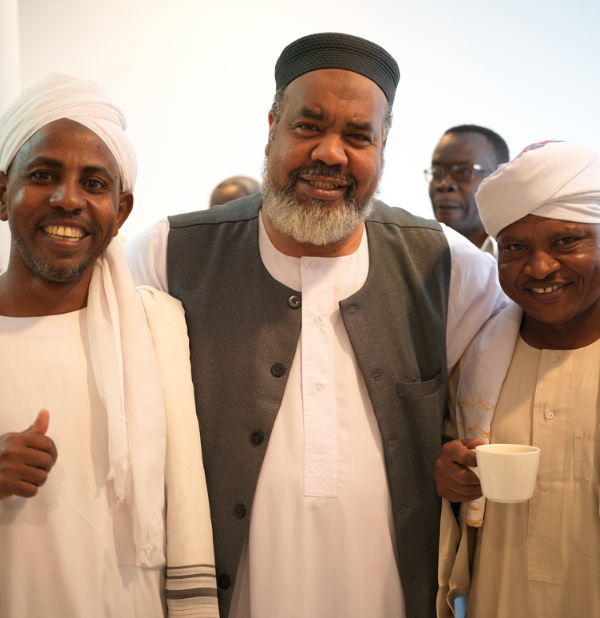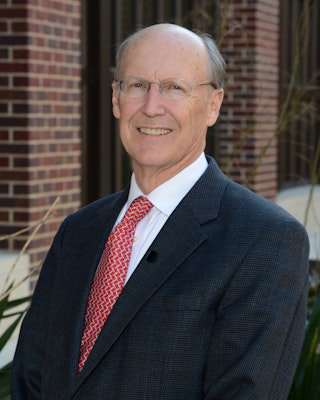Interview
Finding God in one another
Pastor Bob Roberts and Imam Mohamed Magid on how true faith requires us to engage with difference
 Baptist Pastor Bob Roberts and Imam Mohammed Magid walk together. (Multi-Faith Neighbors Network)
Baptist Pastor Bob Roberts and Imam Mohammed Magid walk together. (Multi-Faith Neighbors Network)
Pastor Bob Roberts, a Baptist minister from Texas who serves as President of the Institute of Global Engagement in Washington, D.C., and Imam Mohammed Magid, resident scholar of the ADAMS Center in Northern Virginia, are two of the founders of the Multi-Faith Neighbors Network (MFNN). Along with fellow Christian, Muslim, and Jewish clergy, the pair carry out MFNN’s goal of collaborating across faith traditions. They spoke with Bush Institute Senior Editorial Advisor William McKenzie about the meaning of religious pluralism and the importance of putting it into practice.
 Pastor Roberts with an imam in Kazakhstan. (Multi-Faith Neighbors Network)
Pastor Roberts with an imam in Kazakhstan. (Multi-Faith Neighbors Network)
How has your faith guided you into the essentials of religious pluralism?
Roberts: I’m sorry to say that initially my faith made space for pluralism, but my religion did not. There was never a priority, desire, concern, or any reason for it.
As I began to engage the world in a non-Christian context, working with the governments of Vietnam, Afghanistan, and other places, I began to realize that I knew nothing about how we live our faith outside the church and beyond doing religious work. I began to think about how Christianity spread and realized that it didn’t spread through preachers doing special events. Rather it was through ordinary people living their faith in practical ways in the public square. That’s what the Book of Acts is all about.
It was an education that I had to go through to help me see the world as God wanted me to see it. I was amazed at how Jesus constantly dealt with all kinds of people. I realized all I knew were church people. So how could I live outside of that? It’s been an educational process for me.
Magid: I grew up in Sudan. We have one culture but a multifaith community. I lived in a neighborhood where we had Christians. The Coptic priests used to come to our home to visit my dad. The idea was that you don’t consider neighbors strangers; you are there for their funerals, weddings, and so forth.
Still, I didn’t realize how big diversity could be until I came to the United States. This is where I first met a Jewish person. He was my father’s doctor. Then my view broadened further when I met this evangelical Christian guy, Pastor Bob Roberts. Another world opened up for me.
My religion and foundation have called me to be open and engage with people. There are many verses in the Holy Quran that call us to connect with others. The same is true in Christianity and Judaism, where “love thy neighbor” is the Golden Rule.
But I worried about whether I’d be accepted here, especially being an immigrant in America, a Black man, and a Muslim. There was 9/11, and before that [the controversy surrounding] Salman Rushdie, and all kinds of issues. In the West, there were tensions in some people’s minds between the Muslim community and others. I kept telling my community to just practice your faith. Be who you are. We found loving, caring individuals who were Christians, Jews, Hindus, and Buddhists. They stood with us.
 Pastor Roberts with an imam in Kazakhstan. (Multi-Faith Neighbors Network)
Pastor Roberts with an imam in Kazakhstan. (Multi-Faith Neighbors Network)
You mentioned the Golden Rule and a caring community. What other essentials are necessary for religious pluralism to take root?
Roberts: First, you have to respect others. The Bible says we’re all created in the image of God. That ought to make you respect other people.
Another big critical characteristic is listening. We like to tell our story and jump right in. But we have to listen. We have to be quiet. We need to ask questions, and not just say, “Here’s what I want you to know about me.” Are we curious about people? I mean, everybody’s got a story.
As I got to know Magid, I loved hearing his stories about growing up in Sudan. And what it was like being the son of a grand mufti, and then a very significant leader here in his own right.
Another characteristic is you can’t be easily offended. If you’re going to have a conversation with someone, they’re going to say something that may be wrong or offensive. When you’re in a relationship, you become vulnerable, and you may say something wrong. I’ve had to say I’m sorry a whole lot.
Many, many times I have realized the world’s a lot bigger than my background as a Baptist pastor from East Texas. You have to be curious, not easily offended, and understand that the other person really does want to get to know you.
Magid: I would build on what Bob said and add humility. You cannot do anything without humility. Being holier than thou and looking down on others will suck the air out of the room. That’s not the way to build relationships. You need humility. And part of humility is when you realize you don’t have all the answers.
Of course, God Almighty in His infinite wisdom has all the solutions. But sometimes, even within the Muslim community, we might think that our understanding of our faith has all the answers. That’s not true. You’ll find somebody who has more wisdom than you and who says something profound that you never thought about. To create a pluralistic society, you have to believe in the marketplace of ideas. You have to open your heart and your mind to seek wisdom from people other than yourself and even your own faith.
 Imam Magid with imams in Sudan. (Multi-Faith Neighbors Network)
Imam Magid with imams in Sudan. (Multi-Faith Neighbors Network)
How do we teach humility and respect?
Roberts: It’s in our holy scriptures. Magid, I was thinking about this very thing this morning. I believe that Jesus is the way, the truth, and the life. I believe he’s the only way to God. As an evangelical, this ought not to make me cocky. I should be the most humble man. I have nothing to prove and everything to gain if somebody is going to listen to what I’m going to say. So Majid, I just want to affirm what you said about humility.
The New Testament says we ought to think of other people more highly than we think of ourselves. We should put others first. So if I’m really going to follow Jesus, I should view Magid as more important than me and his needs as more important than mine. That’s radical. That’s not a popular way to answer, but that is a biblical way. And when you put somebody above yourself, you treat them with respect, kindness, consideration.
Magid is one of the kindest men I’ve ever met. It doesn’t matter if you’re a big dog or a little dog, you’re going to get the same treatment from him.
Magid: I agree with every word, except how he presented me. You see humility being practiced when you have privilege, and you use your privilege to help those who are vulnerable. You don’t use privilege to take advantage of vulnerable people. That’s why Bob is unique. As an evangelical Christian in the United States, he has the privilege of being in the majority both ethnically and religiously. Yet he can relate to Muslims, Hindus, Jews and others. He invites us in, even to his church, to speak to his community.
Humility relates to how you see humanity. The Christian image of God is similar to Islam’s. Both believe all humans are equal, that we were born the same way everyone else was born, that the blood in our veins is the same as in everyone else. And at the end of the day, dust to dust and ashes to ashes. If you believe in those concepts, they lead to humility.
The other thing about teaching humility is to believe that all of us are vulnerable. During COVID, we were all grounded in our homes. That was a very humbling moment in the history of humankind. From kings and the richest person to ordinary people, all of us were vulnerable.
As an imam, when I see a person attacking a church, I ask, who gave you that right? Who is playing God here? It’s very important to know our place as human beings. We are not God. Only God has the infinite power, authority, and sovereignty over this world. All of us are little players. The more we understand the nature of the relationship between us and God, the more humble we become.
 Imam Magid with imams in Sudan. (Multi-Faith Neighbors Network)
Imam Magid with imams in Sudan. (Multi-Faith Neighbors Network)
We live in fractious times. Where do you see religious pluralism taking place today?
Roberts: I see it between people at work. Our organization recently got called to discuss our work at a grocery store chain and a law firm. We were asked to visit about how we relate to other religions. Magid and I also were asked to speak to Air Force chaplains. So, I’d say, for good or bad, work is the number one place.
Schools also present an opportunity for religious pluralism. Kids get along much better than we do. They’re more accepting.
Magid and I do retreats where we’ll get a church group and a mosque group to visit the other’s place of worship. I was in a mosque in Azerbaijan earlier this year and was very moved. I was praying in the back, while Muslims were praying up front. I looked over and there was a father with his young son, teaching him how to pray. That moved me, and I thought, I may not agree with him theologically, but he cares about God, and he cares that his son knows who God is, and he cares that his son knows how to pray. I felt an affinity toward that father. You have to respect what he was doing. As I tweeted about that moment, I thought some Christian may get upset with me. But then I thought, no, here is a human being seeking God, trying to help his child seek God.
Magid: I agree with Bob about workplaces. In corporate America, people develop friendships with people of other faiths and invite them to the weddings of their children and to other events. You see diversity in those events because of the working relationships.
Our philosophy at MFNN is to engage people, but also to work together with our hands, to sweat together. That way, you connect people of faith together. We had a program welcoming Afghan refugees. Mosques, churches, and synagogues opened their doors to collect items for them. It was amazing to see. You cannot imagine how many people have said that they’ve seen Muslims dropping things off at the synagogue or Christians bringing items to the mosque. This is part of welcoming the stranger.
Sports is another place this works. The connection kids have on the soccer field or basketball court creates this kind of pluralism. Neighborhoods also create opportunities. You may live next to someone who doesn’t believe like you or look like you. That’s important and a unique American model. Even in Europe, some Muslims live in ghettos. Here, American Muslims live in suburbs where their neighbors are Christians and Jews and others.
I don’t believe you should have a neighborhood that’s all Muslims. Let it be mixed, because you’re going to challenge yourself with the scriptural imperative to love thy neighbor. When the neighbor does not look like you, and does not speak or believe like you, you still are supposed to love them. You have to get out of your comfort zone. That is how pluralism manifests itself.
The Catalyst believes that ideas matter. We aim to stimulate debate on the most important issues of the day, featuring a range of arguments that are constructive, high-minded, and share our core values of freedom, opportunity, accountability, and compassion. To that end, we seek out ideas that may challenge us, and the authors’ views presented here are their own; The Catalyst does not endorse any particular policy, politician, or party.

